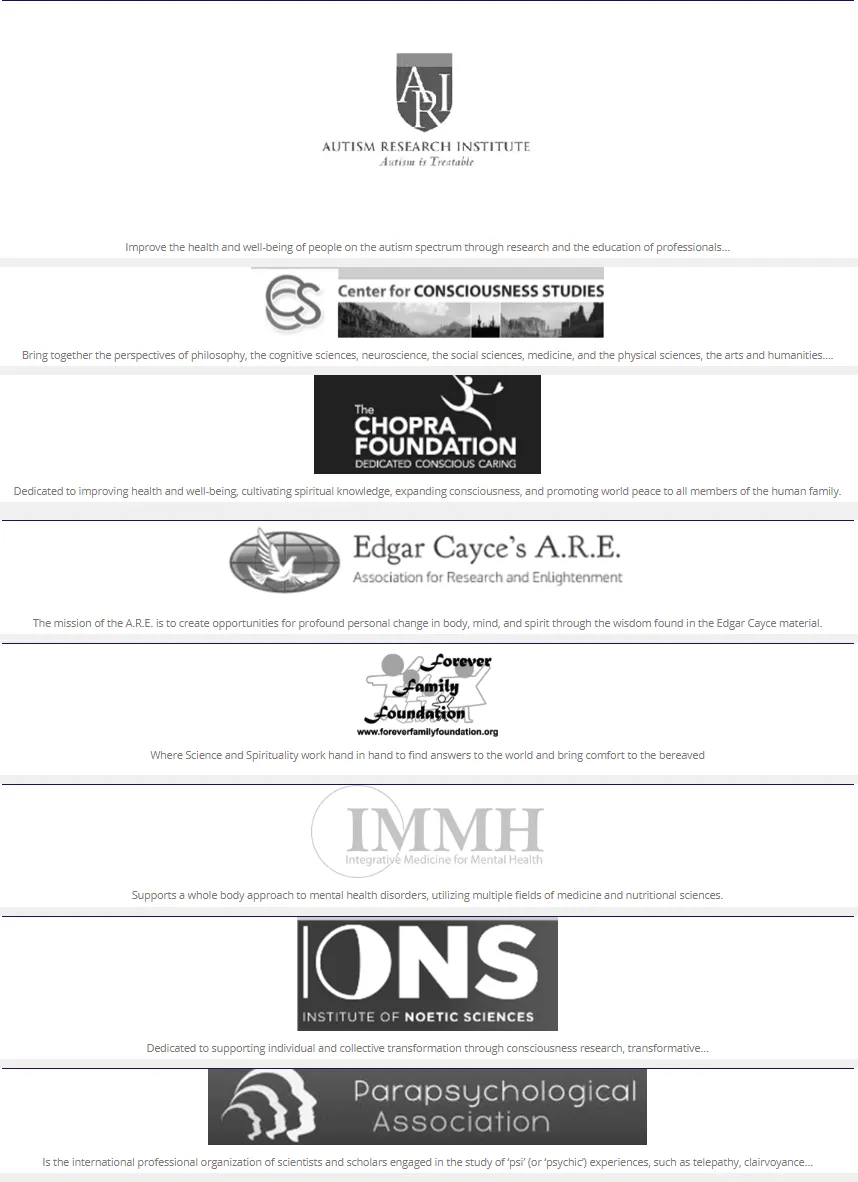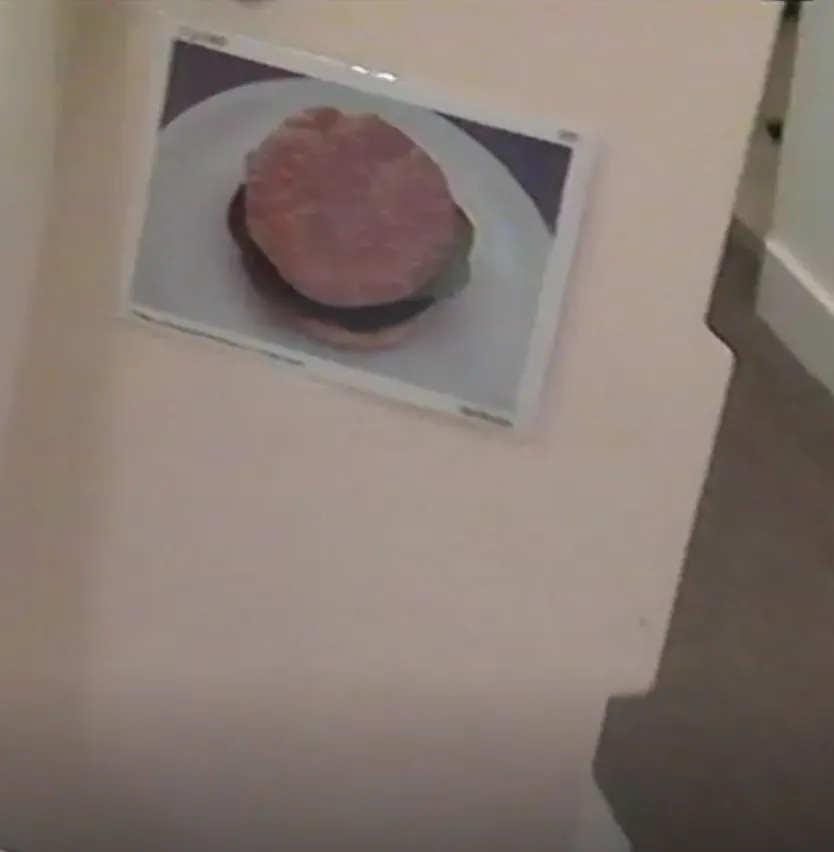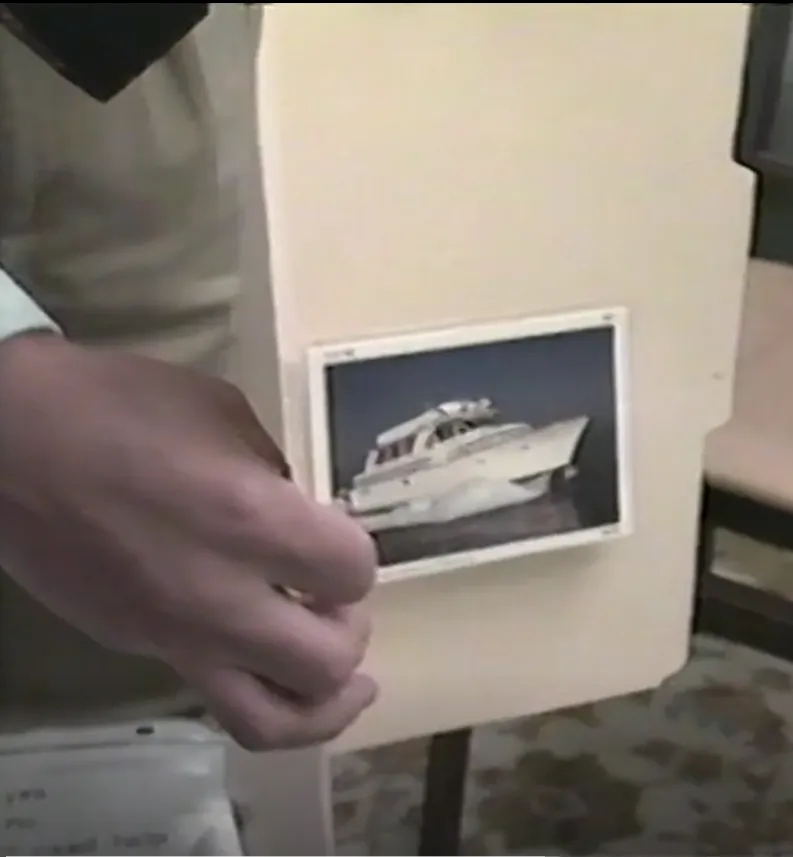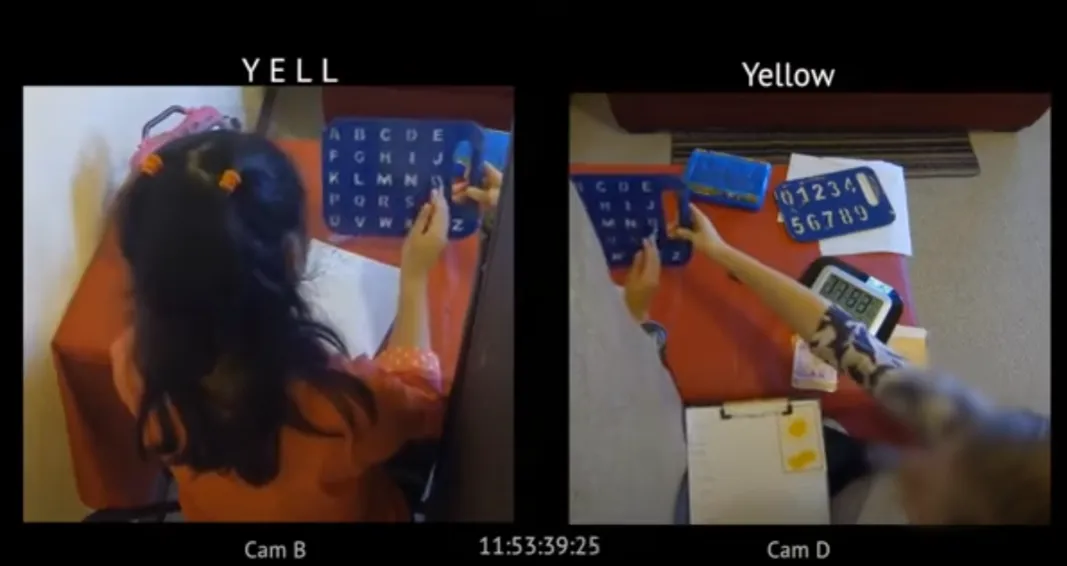Wham, Bam, Autism scams: The Telepathy Tapes Part 1
Bronwyn Rideout - 4th August 2025
“…she always tells me about these God visits, as she calls them, that happen at night. And so I said, Did he talk to you again last night? And she said, Yes, unfortunately…”
To which I can only respond with:

Which may be far too on-the-nose for what is happening to Maura’s daughter, if you listen to that episode.
As the story goes, Dickens’ inspiration for The Telepathy Tapes came from listening to an episode of the podcast The Cosmos in You. Dr. Diane Hennacy Powell was a guest on the podcast, and discussed her work on telepathy and the research she was conducting with Deepak Chopra. On her website, various podcasts, and by Dickens, Powell is called an academic, a researcher, an expert in autism and dementia, and a student of “ancient wisdom traditions”. Powell is a John Hopkins-trained psychiatrist who has had a medical degree for a year longer than I have been alive. But, aside from her non-peer-reviewed books and book reviews, there is little available publicly that indicates a traditional academic research publication output, either on PubMed or Google Scholar, under either her married or maiden names. In The Cosmos in You, Powell states that she was published in neurochemistry, but I was unable to ascertain whether she meant she published in The Journal of Neurochemistry or she had just published on that topic.
Powell doesn’t help matters much, as her current website, which is as polished as it can be, prioritises promoting her less academic efforts, while neglecting to provide any evidence of her actual research chops. The website is overt with displaying her sympathies towards pseudoscience and outright woo. The groups that she lists under her memberships/collaborations/inspirations section have remained unchanged since 2020.


Dr. Powell has allegedly been studying autism since early in her career, and has been reported to have been public with her anti-vaccine views; she even spoke at a 2017 event hosted by RFK Jr (and at least two parents on the podcast believe there is a connection between childhood vaccinations and autism). She’s been specifically promoting the idea of telepathy in non-speaking autistic children for several years but, again, has not published her findings in a form that invites scrutiny under the scientific method or attempts at replicability. However, going the traditional route of academic respectability will be an uphill battle for Powell, due to the communication method used by her subjects and the individuals profiled in the Telepathy Tapes.
The Rapid Prompting Method (RPM, aka Spelling to Communicate or S2C) is described as closely related to, or an advancement of, facilitated communication (FC). FC is a discredited practice where a facilitator guides the arm or hand of the disabled person to help them use a keyboard, letterboard, or other communication tool that would be otherwise unusable by them. During the late 1980s and early 1990s, when FC use was at its first peak of popularity, there were multiple court cases where disabled children reported horrific sexual abuse through their facilitator. Speech Pathologist Howard Shane was brought in as an expert witness in many of these cases, and designed an elegant double-blind test using a manila folder to test the authorship in FC. The facilitator would be shown one image, say that of a dog, while the disabled person would be shown the image of a cat that the facilitator wouldn’t see. When tested about the image seen, the person would “type”, or spell, whatever image the facilitator saw, in this case ‘dog’ - rather than the word for the picture that the disabled person was shown, ‘cat’. Another test that Shane did was to take the disabled individual out of the room and show them an object, such as a key. Then, Shane would have them go back to their facilitator and type what they saw. According to Shane, they could not type the word ‘key’. It was only when Shane showed the key to the facilitator that the child could then spell what they saw.
Stuart Vyse, in his critical review of the Telepathy Tapes for the Skeptical Inquirer, found a copy of a PBS Frontline documentary from 1993. The documentary profiles the first downfall of FC, with stories of families harmed by the practice, and with Shane demonstrating his test. You can watch it here. It was interesting to hear from Cathy Gheradi, the mother of a young man named Matthew, and her growing doubts about FC. Once teachers introduced FC to the classroom, Matthew’s academic capabilities appeared to skyrocket as he started producing high-quality work. Cathy’s disbelief stemmed from Matthew’s success in subjects she knew she would struggle with, as well as his refusal to use FC with her at home. Instead, he would toss the board away when he returned from school and tell his mother that he was “Finished”. Shane has similar suspicions where young children were typing error-free sentences and conveying sophisticated thoughts when they lacked formal training in reading and writing. However, things would go horribly wrong for the Gherardis when, through a facilitator, Matthew accused his father of sexual abuse. The case was eventually dropped, after nine court appearances and testing that proved that Matthew was incapable of authoring the accusations.
From the Frontline documentary “Prisoners of Silence”, Shane shows the facilitator a picture of a sandwich and the child a picture of a boat. When asked to type what they saw, the child spelled Sandwich:


What makes S2C/RPM different from FC is that the facilitator doesn’t touch the non-speaking person, seemingly minimising the risk of misattributing authorship. Instead, the facilitator holds an alphabet stencil while the individual points to specific characters. However, as Vyse and former FC proponent turned activist Janyce Boynton point out, the facilitator can still influence the outcome by moving the board, or by providing verbal prompts to improve the hit rate for correct spelling. Vyse and others have questioned why the board needs to be held, although one Autistic researcher at La Trobe suggested it could be for motor stabilisation, improving the focus of the speller, or that there might be a benefit to having human contact.

“Give me one word,” Manisha said to me. “He’s feeling that unbelief. If you are questioning, you need to change your questioning.”
I apologized for the skepticism inherent in my role as a journalist. Then I handed Manisha a slip that read STRAWBERRY.
This time, instead of typing, Akhil just sat for ten seconds, blanket around his shoulders, iPad on the rug before him.
“Akhil, Akhil,” Manisha said.
Ten more seconds passed. Akhil typed no letters. Manisha said, “Strawberry. Very good.”
Weil feels awful and summarises the duality of hope and grimmness that many parents in Manisha’s position face in a society that offers few options:
My presence put a tear in the survivable world Manisha had constructed. Voice recorders and reporters’ notebooks had no place here. I apologized and called a Lyft, as she clearly wanted me to go.
“This has opened up my child to me. This is working,” Manisha had said to me earlier that morning, laying out the necessary terms of her universe, one in which she is profoundly and inalienably bonded to her son. “If you are telling me this is not working, what else do you have that works? Give me that. I tried everything. I have tried everything.”
Episode 3 is where things start to get weird. A new family is profiled, Houston and his mother, Katie. Katie is a solo-mother to five children, and Houston has significant support needs, which has left her isolated and exhausted. You can add horrified to the list when she started to believe that Houston was telepathic, and thus able to access her negative thoughts about autism, as well as the darker, abusive thoughts of her ex-husband. Katie facilitates for her son using a stencil board, which unintentionally adds a troubling layer to their family trauma as Katie ‘learns’ of horrible things her ex did to another family member:
“But the most heartbreaking thing that Houston had to hold were the sinister thoughts and crimes of others…Katie’s ex committed horrible crimes against another member of the family. Katie didn’t know about the horrific acts as they were occurring. Only Houston did because he could hear everyone’s thoughts and it wasn’t until Houston learned to communicate via spelling that Katie finally found out what had happened.
“He said the hard, one of the hardest things was knowing all of this and not being able to stop it or tell. He’d always wanted to be a hero and because of his inability to control his body or communication, he had not been able to tell us the truth or be the big brother he always wanted to be’”
How much of this is Houston, and how much is Katie, is unclear. Although it is likely Katie, even as a skeptic I actually hope these are authentically Houston’s words. The alternative, in my opinion, is that a very inappropriate role and identity is being put upon Houston by his mother, and no one is intervening to help either of them in favour of pushing this superhero narrative.
Katie describes herself as a practising evangelical Christian, but with her son, her story slants into the New Age, including an attraction to crystals and astral projection. Houston reports that there is a telepathic channel that non-speaking Autistics communicate on called The Hill, which they can access if they mentally tune in at a certain time. While on this same frequency, they share information, pray, and encourage each other. Katie can apparently corroborate this, claiming to have received an email from a mother in Utah stating that her 9-year-old son, whom Katie and Houston never met, said that Houston was his friend. That sounds great, but neither Akhil or Mia, a child featured in episode 1, mentions The Hill. Further, the brief description Katie/Houston gives about the hill, specifically praying and especially supporting those who are discouraged, is very much evangelical Christian coded; quelle surprise, since that is the family’s denomination. The connection between Christianity and this specific belief in telepathy may be unexpected, but it does occur more than once in season 1. David Farrier explores this rabbit-hole further in his Webworm substack.
The Hill is mentioned frequently in episode 4, which follows Houston’s friend John Paul (JP) and JP’s relationship with Lily, another RPM user. Both Lily and JP confirm that they also go to The Hill, which shows that belief in The Hill is shared by Katie and Houston’s wider circle of friends. However, that subject is a distant second to the question of how JP and Lily came to be a couple, and how their families navigate this. The parents encourage what they present as a romantic, albeit naive, relationship. As Lily’s father tells Dickens:
“Everyone loves their relationship in the autism community because we all understand autism and we understand our kids. But for other people, the comment that always drives me nuts is, you leave them alone together?
Because first of all, it doesn’t presume competence. Neither one of them are sexual deviants. He’s not going to attack her. He adores her. And their relationship is on such a different level than what maybe a neurotypical relationship looks like.
It’s more hand-holding and little kisses. There’s so much motor planning that has to go into the other stuff. That- has never been a concern of mine.”
This is a tricky topic because there’s stigma and barriers regarding disability and sexuality, and with the risks inherent with facilitated communication the stakes are that much higher. Dickens shares excerpts of Lily’s and JP’s communication with each other, which all occurs through facilitators. Writing on facilitatedcommunication.org, Janyce Boynton raises the question about the role of the facilitators in intimate relationships of this kind, and whether informed consent can be truly obtained in an S2C/RPM context. It is one of the more serious questions that Dickens fails to interrogate, due to her rose-tinted glasses in wanting to believe in telepathy and the authenticity of S2C/RPM. Again, it’s a scenario where, as a skeptic, you want it to be real because the alternative means that the parents are fabricating, or even forcing, an emotional and physical relationship between two possibly unwilling individuals.
The Hill is mentioned again in episode 5 by a teacher in Chicago who had two non-speaking students tell her about it. And it is at this point that I called time on this podcast for now. I initially chalked up The Hill as being a fabrication of a close circle of friends, a sort of shared fiction that allowed them to imagine a social life for their children that was otherwise out of their reach. To hear how widespread the concept was not only failed to make me believe like it had done with Ky Dickens, but instead has inspired me to seek out what the seed of this idea, and specifically The Hill, was. Was it Dr Powell? Or was there a conference, book, news article, or even film that wormed its way into the minds of parents and teachers?
Because the question is, beyond the release of this podcast, why now? Boynton noted that people have connected telepathy and facilitated communication for decades; even Rosemary Crossley, one of the first advocates of FC, thought it necessary to mention in a 1994 training book that any possible evidence of telepathy was likely due to the facilitator. There has to be more to this than the positive correlation between belief in the paranormal and economic uncertainty.